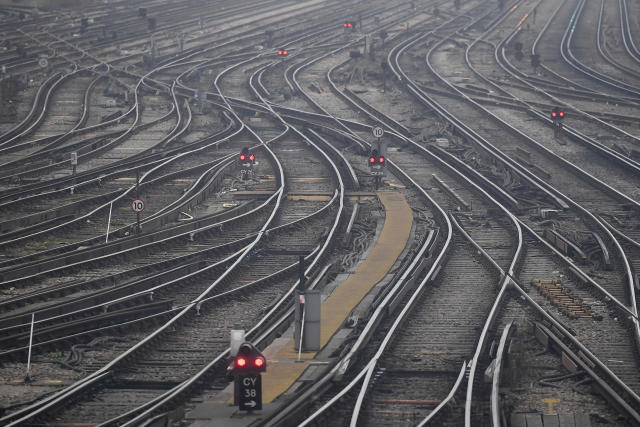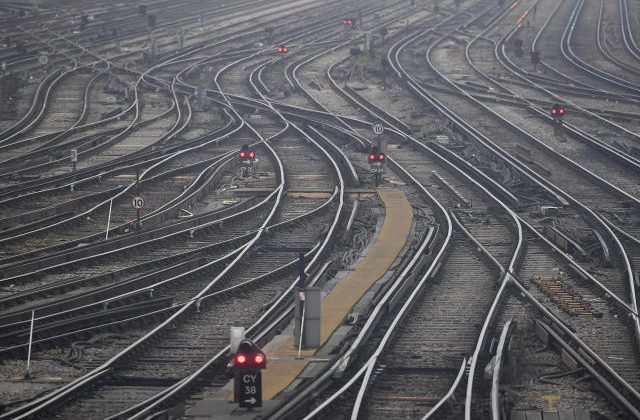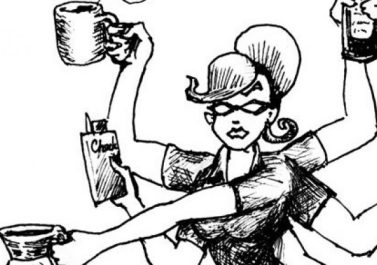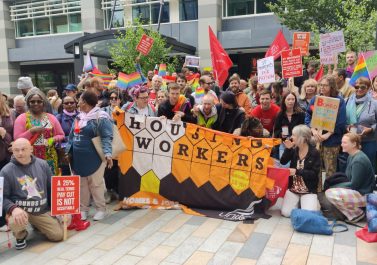
We are seeing an increase in strike action in the UK, which is a good thing, but we don’t know much about the experiences and views of workers who are involved in them. We rely on the official statements of the trade union press officers, which doesn’t help us to answer the main questions when it comes to strikes: are the strikes actually effective, do they hurt the bosses? Do workers overcome divisions between different contracts, departments, professional groups or sectors? Do workers themselves learn how to conduct their own struggles and decide about form and goals?
The following interview with a comrade who works at Transport for London is a small step towards a more general debate between striking workers. We have to create independent forums to lead the debate, independent from political parties or trade union headquarters who have their separate interests when it comes to the strikes and mainly see them as recruitment grounds. If you feel the same, get in touch. If you want to talk about your strike experiences, get in touch. You can read a previous interview with the comrade about the situation during the Covid pandemic here. For a good general overview of the current crisis in global transport, check this out.
——-
*** The current rail strikes
The recent strikes have been declared the biggest rail dispute in a generation, with 50,000 workers from rail services to track maintenance to Transport for London. Was there a different quality to that strike, for example, was there more communication between workers from the different rail sectors?
The experience of the strike wasn’t really different for us on London Underground. The strikes are still organised separately within the RMT. The disputes aren’t really coordinated by the RMT, they are more coordinated by the government. The government decides which of these different departments of the railway industry are under attack and the union reacts. We only really had two days of coordinated strike action where the London Underground and the National Rail have been on strike at the same time. That was a conscious decision to call everyone out on the same days. So are we, as workers, coordinating our disputes? Not really. The two days that were coordinated were called by the head office of the RMT. We don’t seem to have much influence over how many days or dates of the strikes.
It seems odd to me what we are actually doing at the moment, because we don’t seem to have any tactic to win. How do we win this dispute? People want to see a tactic. There just seems to be an acceptance that this dispute will drag on for years. People just get fatigued if you drag it out, without actually escalating. The CWU just announced 28 different strike actions over a month. Why don’t we do something like that? That is a tactic to force some sort of concession from the company. You couldn’t have a government that is in a weaker position really. Do they really want a prolonged, two week-long strike action on the railways? Do they want that on their case? Maybe they do, I don’t know. They would have a public enemy then, but then, public support still seems with us. And the government couldn’t be more unpopular. If you target your strike action against the government, then… there is a lot of piecemeal strike action in the country, but not much coordination.
Did you get in touch with any striking dockers, through the RMT?
No, I don’t know what happened to the Felixstowe dispute, for example.
Within the rail sector, is there coordination about the issues of the strikes? I mean, when it comes to Transport for London it is about pensions, with rail maintenance it is about introduction of new work practices, and with National Rail it is about ticket offices. Is there something like a common list of demands, in the sense that the Transport for London workers would support the demands of the rail maintenance workers and potentially continue the industrial dispute in their support?
In an ideal world we would love to come out in support of the rail workers, but it’s not going to happen. Even inside of London Underground, although it’s a pension dispute, it’s also a dispute about staffing on the stations, because they want to cut station staff by 600 jobs. Station staff took one day of action, on their own. That was in August I think. Since then we didn’t have more station staff going out specifically over this issue. From the train drivers side within London Underground, no one seems to be too interested in solidarity with the station staff. People focus on the pension aspect – people like that, because it affects the whole workforce. ASLEF, the other main union, on the other hand haven’t come out on strike at all, and are actively trying to undermine the dispute by crossing picket lines. So there are divisions amongst workers even about that issue. So it is hard to get solidarity even just within London Underground. So a solidarity strike across the whole rail industry hasn’t really been discussed.
With the pension dispute, management has put forward a document to the government saying that implementing the changes to the pension system itself would cost more than you would save from the new pension system. The government said to TFL, you have to make 100 million pounds of ‘savings’ from the pension scheme a year. The pensions were reevaluated in 2020 and the company reduced their contribution to it, saving 70 million. The fact that management now tells the government that further changes would not save further money is also a consequence of our strikes. In 2020 management and Sadiq Khan still agreed to changes, since then we had a few strikes. But we don’t know if the government will listen to that.
What about the dispute for London Underground cleaners, the campaign for an hourly wage of £15? Was that taken on as part of the current strikes or does it remain separate? There was a cleaners’ strike at Churchill a while ago, but in the current strikes, were the cleaners involved?
No, not really. Sadiq Khan announced some weeks ago that all cleaners who are working on the Underground will get a free travel pass from April next year. That is something that we have been campaigning for for years. That is a pretty big victory for them, that could save some of them several hundred pounds a year. That is for outsourced cleaners, there are 2,000 of them. We tried to get a strike vote on this over the line before Covid, but it failed by a margin.
Another question I asked one of the ASLEF guys was about freight services and why they are not engaged in the industrial action. You could hit the economy more, couldn’t you?
The Network Rail dispute, the signallers, is nationwide, that should be affecting freight, as well. But then freight drivers would probably be in ASLEF. ASLEF are only involved in seven, eight train companies. I don’t know if the other companies have all agreed pay rises, at least that’s what I have heard. ASLEF also called strikes on different days from the RMT, at least during the first three days. There should be more coordination, really. This is sectionalism at its worst.
*** The dispute over night-tube trains
At Transport for London we were in fact in two disputes, one about the night-tube issue, because the company was trying to force us to work night-tube shifts. Previously we had part-time drivers who would work Friday and Saturday nights. With Covid the night tube closed down. As Covid is easing they wanted to bring that back in. During that period they had made most of the former part-time drivers full-time on normal shifts and therefore had no staff to cover Friday and Saturday nights. They came to ASLEF and the RMT and said, ‘we’d like to bring Friday and Saturday night into the normal full-time roster’, as part of your regular working roster. ASLEF met with management separate from the RMT and agreed to this deal. They announced it as a great deal, with a little overtime bonus. Currently 55% of unionised drivers are with ASLEF, the rest with RMT. It was a fait accompli, they shouldn’t even have met with management without the RMT. We were all up in arms, we didn’t want to work Friday and Saturday nights. Crowbarring something like this into a roster is stressful, you end up working Monday, Tuesday Wednesday on a late, Thursday off, Friday, Saturday night, Sunday off, back on Monday. It’s a real headlock to switch between nights and lates. We went into dispute over that. The whole dispute was always difficult, because ASLEF said this deal is done, there is nothing you can do about it. Initially we had two successful days of strike action, where we shut down the five night-tube lines. Then we moved to a strike that was every Friday and Saturday night, only on the Central and Victoria lines, because these were the only two lines they brought back initially. Central and Victoria are majority ASLEF lines, that is perhaps why they decided to bring them back first, as night tube lines. The pickets on the Friday and Saturday nights, the reps would come out during the winter till midnight, it was hard work and there were not many people with them, often only two people on the picket. Especially on the Victoria line the pickets lasted only through the first four or six weeks. The service on the Victoria line was pretty good then. In June they brought in the Northern and the Jubilee line. There were no real pickets against this. The strike seemed to be pretty ineffective at that point.
I work on the Piccadilly line, where the RMT has 80% of drivers. They hadn’t brought weekend night tube back and we were looking forward to going on strike over it. They knew that if they had tried, there wouldn’t have been a night service on the Piccadilly line. It would have been an effective strike. The week before the night tube was supposed to start they called a rep meeting and called off the whole dispute. The main reason was that the strike at the Northern and Jubilee were so ineffective. So the night tube is now in. We lost a lot of weekend rest days. It’s now much harder to get a weekend off. You only get the bonus if you work actual nights, so 90% of drivers don’t get anything for it. There was no increase in pay or increase in holidays. For management this only saved them £3 million a year, which is a minuscule amount of money for the organisation. It was kind of annoying, because the reps that agreed to the deal at the same time told us that ‘we won’. Because the company told them that they will try it so that ‘no one is forced to work these night tube shifts, we will try and cover it with volunteers’. But in the same sentence they say that if there are no volunteers you have to work these shifts. The reps were just repeating what the company was saying.
*** The current political situation
With Mick Lynch and the recent strikes there has been a bit of a shift though. During previous strikes the RMT tended to speak about ‘the public’ and how their strikes are not against ‘the public’ or ‘the customers’. Now this has shifted a bit towards ‘the working class’, there is more talk about how the strikes within rail relate to other working class disputes. That’s a political step forward, isn’t it?
Yes, I have noticed that. People used to focus more on their own terms and conditions, they look at their dispute now in a broader sense. More as a conflict between the working class and the government or the Tory party. So, though it is political in a sense, it is always against the Tory party. The Tory party are the bad guys that are standing in the way of pay rises or better conditions. Still, there is a feeling of being part of a wider movement, which is new.
Do they see that they have a bit of responsibility for the working class?
It’s a difficult one. The guys who have worked on the Underground for 20 plus years feel that they are losing, since 1995 or whatever. They feel like it has been a steady decline. From the outside rail workers are viewed as industrially strong and militant. The long-term guys say that they used to be strong and militant in the 90s, but that it’s not like that anymore. They think we are on the back-foot, a defensive. They feel more divided than back then. They had experiences of wildcat strike, back in the late 80s, early 90s. Now that doesn’t happen anymore. The actions we take now are not as effective as those wildcat actions in the past. And it’s true, we had quite a lot of strike action in the last six months, but the government are not budging.
That’s the other issue with the strikes. Mick Lynch says that if the government wouldn’t interfere the union and management would come to an agreement. Where usually the unions ask the state to mediate, in this case the union says ‘leave us alone, we can negotiate a deal’. Do you think it’s true that the government has a political interest to ‘drag the dispute out’?
I mean, when Liz Truss came in she talked about these minimum service levels, to bring them in for transport strikes. I don’t know what their legislation plan is for that or how quick they can bring it in – they are obviously in complete disarray. This might be the strategy from both company and government, to drag things out until the law has changed. That could be the plan. But then it’s ridiculous, because these companies, they are kind of fake private companies. The way that these railway contracts work. They are not really separate from the government and never have been. Although they call it privatised railways, they have been entirely subsidised by the government since Covid. Most of them wouldn’t make any profit, they are just living off the government management fees. They get their profits guaranteed and they know that whatever disputes they have the government will back them. Like Avanti, the rail company up North, they halved the services, but are still cashing in on government money.
Let’s talk about ‘Enough is Enough’. Is that actually coming from the rank-and-file or is this more of a pet of the leadership to have more occasions to give speeches?
You can’t argue with what Mick Lynch has done on the television, that engages the rank-and-file more, it does inspire them. Seeing him on the television. He is good on the television. They take heart from that. It is perhaps a bit disheartening in a way, that they feel they need someone to lead them, but they feel more confident with him in charge than with Mick Cash, the previous guy. He is doing a good job of linking the dispute with a wider class struggle.
But ‘Enough is Enough’ as a structure? I mean, Unite said they didn’t join because there was no ‘democratic mandate’ through the union structure? Does the campaign have a relevance on the shop-floor? Or is it more like a rallying point, where you protest every few months?
I haven’t heard anyone specifically referring to ‘Enough is Enough’ and I am not aware of the organising structures in it, I am not aware of how it functions. It seems a bit unclear what the general idea of it is. I heard of a couple of people who went to the rally in Clapham. But I think people find it inspirational in general. But there doesn’t seem to be a plan to take it anywhere.
Have RMT branches taken on issues such as energy prices?
We did have a ‘Don’t Pay’ resolution. That went through the regional council to support the ‘Don’t pay’ campaign. And there have been people leafletting the workplace and stuff. But I don’t know how that ‘Don’t Pay’ campaign was affected by the announcement of the energy price cap, which doesn’t seem to be an energy price cap at all. We recently set up a hardship fund, but that’s mainly for strike action.
When it comes to the bail-outs of rail companies during Covid, the RMT presents it as ‘the Tories pay money to their friends, the fat cats’, meaning, to the CEOs of various private companies. How much is it that and how much is it that the infrastructure is actually underfunded, the profit margins minimal and the companies therefore in need of constant subsidies? Or both?
The actual management of the rail companies isn’t particularly profitable. The main profits are made by the ROSCO companies, the rolling stock companies, the companies that lease engines and wagons and stuff. They are basically like investment funds. The trains are then rented to the rail companies.These companies have no operational involvement. The rail companies in turn keep on threatening the government that they walk away from the business, to get bigger bail-outs. The government is on the back-foot and offers better deals for them to stay. At the same time the government has to take them off frequently, because they are so bad at operating the rail services.
Amey, an outsourced service company that runs stuff like waste collection, street cleaning or army facility management in the UK has just been sold by the mother company, which is a Spanish rail and airport company, after years of fragile contacts with local councils. These structures are actually shaky.
Yes, mass transport is not a profitable business. The infrastructure is too complicated, there are too many unknowns, the investment is too long-term for quick returns. They knew all this in the 20s and 30s in this country, when they had privatised railways in this country. It wasn’t working, the companies were constantly going bankrupt or services became unaffordable. The state decided to nationalise the system to get things on track. They figured that out back then, but had forgotten about it by the 1990s.
*** The attacks in form of legal changes and restructuring
One change the government brought in was the possible use of agency work to replace striking workers. They have now used this for the first time to replace striking school staff in Romford. Is this relevant on the railways, was it relevant during the strike?
I think on the railway this is nonsense. There is no such a thing as an agency signaller. If you have trained as a train driver, you are directly employed. There are track workers that are from agencies, but they are not trained to a standard that they could run the maintenance, they are generally labourers, they can’t do inspections, for example. I mean, people would die if they would try to replace staff with agency people.
They also talk about changes to the work practices for maintenance crews and signallers, forcing people to do more varied job tasks that they might have been trained for, but have not actual experience in doing. The strike is partly opposed to this plan. What do they actually want to change and how relevant do you think it is?
I think in general they want to reduce the amount of inspections of the infrastructure. There was a rail crash in Scotland in 2020, during Covid actually, three people died. An Intercity train hit a lot of gravel that had spilled out of a drain. The train derailed, the driver and two passengers were killed. That drain had been put in wrong ten years previously and was never inspected for ten years. If it hadn’t been for Covid this train would have been much busier. It’s a clear example that not enough inspections are being done. Another thing they want to change is the regulation about where to start your shift, I think. They want more flexibility in that, because normally, as a track worker, you would first go to your depot, that’s where you start your shift, and then you travel to wherever you are working, and end your shift at the depot. They could get two, three hours more work out of the track workers if the shift would start on the actual track site.
With the legal screws getting tightened to curb strike activity, is there any discussion how to react to that?There are campaigns, like ‘Free our Unions’, but on a direct tactical or strategical level?
That has actually been quite encouraging. The conversations we had in the workplace. People are tired of having to jump through legal hoops, where it takes you weeks between raising the issue and actually taking action. People struggle to understand what the minimum service law means. They try to hold the RMT and ASLEF legally accountable to provide a minimum number of trains on strike days. If these trains don’t run it would financially cripple the unions. It raises the issue of going back to more wildcat kind of actions. People do seem kind of receptive to that kind of idea. I say to people that, ‘we technically don’t really need a union to go on strike’, you don’t need the legal entity of the RMT. If they use the legal structure or the brand of the RMT to restrict us, then you have to be prepared to take strike action without the RMT. That’s possible, strike action just means that you are not going to work. We can just set up shadow branches.’ Some people respond that then each person could be held individually responsible for illegal industrial action. But that’s difficult if, let’s say, 10,000 people walk out. Can the state really prosecute 10,000 people or press criminal charges because they don’t go to work that day? The company doesn’t have the resources to discipline 10,000 people. If you have 10,000 people on a disciplinary, you create another strike action. There is pretty much a sense of lawlessness and general chaos to the country at the moment. It feels like the government or the politicians are breaking the law quite consistently for a number of years. And then they want us to stick to the law.
In some departments or sections of the railways there seems to be a threat of job cuts, such as station staff or ticket offices, while in other sections there is an acute shortage of labour, like amongst train drivers or signallers. Avanti had to half the train services due to lack of drivers. How does that affect the struggle?
They are deliberately not recruiting. At Avanti they always had less drivers than they needed. They have always done rest-day working, they always worked Sunday as overtime. Since Covid, and the reduction of trains, they let the number of drivers run down. The same happened on the Underground. They haven’t been training enough drivers. They leave vacancies open, which makes it easier for them to push through job cuts. They tell us in negotiations: ’No one will lose their job, there are all these vacancies’. I notice it on the Underground, everyday, on certain lines, there are cancellations due to staff shortage. But then the ticket offices that they want to close on the mainline railway, are also functioning as a backup for train drivers, for example if you can’t drive trains anymore due to medical reasons, you would still have a job available in the ticket office or on the station. These jobs are now under attack, so its a reason why ASLEF train driver members should be fighting to save these jobs.
But are they not willing to train new people or not able to?
They want to reduce the amount of trains and services running. Managed decline. They spend less money. With Avanti, it’s not how many tickets they sell, they get a flat-rate from the government. With the London Underground, it’s the same number of people paying to travel, if you run less trains, you just pack them in. That’s what they want to get back to. Pre-Covid they were running over 100% capacity.
What about the issue of driverless trains? That is also presented as a possible attack on workers? They always present that as a scary thing, but is it actually a threat?
It is part of the latest bailout that Transport for London has agreed, the possible introduction of driverless trains. They agreed to set aside a sum of money to start an investigation into driverless trains. Which is crazy. Driverless trains will probably cost more than Crossrail. Crossrail is obviously a new line, but they still put drivers on there. If you build a brand new line, it is far easier to make it driverless, but they didn’t. On the brand-new Elizabeth Line people have to switch trains when they enter the underground sections of the line because they could not make the signalling software of the national rail correspond with the underground signalling. Singapore had driverless trains, but they put drivers back on there, they realised that the service worked better. The whole system has to be designed from the bottom up to be driverless. You have to eliminate any possibility that the train is going to hit anything. If the train hits an obstacle and there is no driver, what will it do? Carry on or stop? And if it stops, what happens? Because you don’t know what it hit. Something like the Victoria Line, which is entirely underground, if you put platform edge doors on every platform of the Victoria Line you could eliminate any variables. But then to put platform edge doors on every platform, to retro-fit new technology on old infrastructure… you know how tiny the Victoria Line platforms are and you know that some of them are curved. How do you put platform edge doors on a curved platform?
You encounter so many problems that you were not expecting, trying to upgrade old infrastructure. Some of the signals on the national rail, like in Devon, still need electrifying and they talk about driverless trains, for god’s sake! They don’t realise how far behind some of the technology is. The signalling on the Piccadilly Line is from the 1950s. They cancelled the signalling upgrade on the Piccadilly Line just before Covid, to pay for Crossrail. A totally new signalling system on the Piccadilly Line would take ten years to build. Even though driverless trains are phantasy stuff, they still force TFL to spend money on it. It only cost them £3 million to force us to work on Friday and Saturday night tubes, that is a minuscule amount in comparison, but then they complain that drivers are expensive.
*** The rank-and-file within the RMT
Back then during Covid the NEC called off the pay strike. The structure that allowed this to happen, is that still in place? Are people more weary of such top-down decisions?
If anything, it is probably worse now. Mick Lynch who won the general secretary election is now pretty much untouchable. At the moment, whatever is recommended by head-office regarding settling of these disputes, will be accepted by the rank-and-file. This is the flip side of his large media personality.
There is no new rank-and-file initiative? We’ve got stuff happening inside Unison at the moment, ‘Time for a Real Change’, but that is pretty much a left party vehicle. Is there a stronger rank-and-file tendency within the RMT?
There was a rank-and-file tendency behind Mick Lynch, Alex Gordon and Ed Dempsey, called the Broad Left, to get these guys elected into these positions. But because they were successful and got them elected, they have taken a back-seat now. The Broad Left is now in charge of the union. They were in opposition to a rank-and-file movement that we were trying to set up, but that didn’t get going anyway, the ‘Campaign for a Fighting Democratic Union’. That never got fully off the ground, because we couldn’t get any agreement between the two main left parties inside RMT, the AWL and the Socialist Party. It all fell apart and the Broad Left was building their support base. Some people who were involved with the Campaign for a Fighting Union’ have moved towards the Broad Left, seeing that they were dominant. If you want to have any position within the union, you have to suck up to them. If there will be a rank-and-file movement again, I think it will have to be cross-union, and involve ASLEF and others, as well. We need a public transport rank-and-file movement, that involves workers on buses, as well and other transport sectors. Rather than just a rank-and-file within the RMT.



